Less than six years ago, the British-born Muslim Tania Joya was living in Syria with her husband, an American-born convert to Islam who was becoming an increasingly influential figure in the circles of Islamic State. Next week, she will be giving a talk about “countering the forces of violent extremism” at Temple Shalom, a synagogue in Dallas, Texas.
As far as Joya knows, her ex, the former Greek Orthodox Christian John Georgelas who for 17 years has gone under the name of Yahya al-Bahrumi, is still active in Syria with Islamic State, where he is said to head the jihadi terror group’s English-language propaganda operation and to be its most senior American recruit. For her part, Joya has renounced Islam, is becoming increasingly attracted to Jewish customs and rituals, took her sons to help decorate the sukka at Temple Shalom a few months ago, and says she intends to come to Jerusalem.
The rapid transformation of Joya’s life — from a self-styled former “hard-core” jihadi and dutiful spouse of an Islamic extremist, to a declared de-radicalization activist — is so stark and improbable as to leave doubts, she acknowledges, in many people’s minds. In a British television appearance a year ago, her hosts cut short her interview after she said, when asked if she still loved her ex-husband, “I don’t love him like I’m in love with him; I love him because he gave me four beautiful, lovely children… If he’s caught, he needs to go to prison, of course… I love him like I love people… Everybody has a good side; everybody has a bad side.” Said her interviewer, Piers Morgan, caustically: “ISIS terrorists don’t have a good side, and so I’m afraid we’re going to end the interview right there.”
Joya says that much-watched short excerpt of the interview is unfair; elsewhere in the conversation she had tried to explain how and why she had been drawn to Islamic extremism, and also called the Quran “a terrible book” that advocates jihad and war.
When she sums up the twists and turns of her fairly young life — Joya is 34 — in a recent telephone interview, her first with an Israeli journalist, it makes for an all-too plausible narrative. And while her escape from Syria, pregnant and with three kids in tow, and her improbable revival in Texas, are highly dramatic, what is most striking and alarming about the saga is the consummate ease with which Joya was indoctrinated into Islamic radicalism in the first place and the zeal with which she took up the monstrous cause.
How it all began
The way she tells it, Joya was an impressionable British Muslim teenager, from what she insists was not a radical Muslim home, who had a difficult relationship with her parents, who was physically unwell, who thought God was punishing her, and who grabbed hold of Islamic extremist certainties as what she now regards as some kind of a hideous support system. “I didn’t want to be that sucker who got indoctrinated. But the facts are undeniable,” she says over the phone from Texas. And, more constructively, “If I can be reformed through knowledge and facts, there are others who can.”
Joya grew up near London as Joya Choudhury, the daughter of Bangladeshi-born parents, who she describes as “culturally Muslim.” Asked whether they were extreme, she laughs and says, “Oh, no, no, no, no, no. I wouldn’t use that word.” And yet later in our conversation, when she muses about how her life might have turned out had she not been a Muslim, she says, “I probably would have been happier in the UK. I would have been allowed to integrate, whereas my parents didn’t allow it, because it was culturally shameful to integrate with the English customs. Even to wear Western clothing, makeup. You get shamed, if you try to be Westernized, by the Muslim community that I grew up in — my parents, my friends, the teachers that I had to learn the Quran from every day for two hours after school, which was a complete waste of time. Because really that time should have been used for my education — helping me to read and be good at school. I had to read the Quran every day of my life when I lived with my parents, but they’re still considered moderate. These terms don’t work. They’re not the whole truth.”
The family was poor, her father was verbally abusive, and her mother, when they argued, would scream at her that “I wish I’d never had you,” she told the Texas Monthly in a lengthy November 2017 feature. She cites her home life immediately when I ask her what drew her to extremism: “I guess it has a lot to do with my upbringing, of not trusting my parents. When you don’t have good role models or authority figures that you can trust, it’s not good for a child.
“I was an insecure girl. I had serious problems at home,” Joya elaborates. “I was drawn to the idea of finding another home, another family. I needed that because that made me feel like I had a community — people who can support me. I needed support. Also, I was getting over depression and illness. That made me think a lot about death and dying, and that God hated me. I wanted redemption for things that I thought were sins, that weren’t really sins. I was a young, naive, gullible, superstitious girl, who feared science because it contradicted my beliefs and religion.”
And so it came to pass that, by her late teens, “she was draping herself in a full-body covering, or jilbab,” Graeme Wood wrote of her in a March, 2017, Atlantic article that pinpointed her husband as The American Climbing the Ranks of ISIS. “She fantasized about packing a bomb under it.”
‘I was 19, he was still 18’
She came across John Georgelas/Yahya al-Bahrumi on a Muslim matrimonial website in 2003. At the time, according to the Texas Monthly, he was studying Arabic in Damascus. He had converted to Islam in the immediate aftermath of 9/11 and begun the descent into radicalism. He courted her via email, and came to England to visit her. “He was wearing shaggy, tattered clothes. He had a short beard. I thought he looked like a prophet from medieval times,” she told her Texas Monthly interviewer, Abigail Pesta. “I didn’t find him attractive, but I felt pressure to like him. I thought, he’s come all the way from Syria; I felt an obligation.”
She liked his idea of living in the Middle East. She was growing attracted to the idea of jihad, which she had begun to regard as “a solution.” And her parents, impressed by his relatively upscale American background, approved of him. They got married almost immediately, in a secret ceremony in March 2003 — “I was 19, he was still 18,” she says — and in a formal ceremony two months later, with Joya covered up in the Islamic robe and veil that would now become her normal mode of dress.
They then went to visit his parents in Plano, Texas, and lived variously in London, pre-civil war Syria, California, and Dallas, where her husband provided tech support for a jihadi propaganda site while his main employment was at Rackspace, a leading computer server firm. In 2006, he was arrested and sentenced to almost three years in jail for accessing the passwords and plotting to hack the website of the pro-Israel lobby AIPAC.
The way the Atlantic described the first years of their marriage, “Yahya maintained a Rasputinlike control over her. He hadn’t had much success finding social esteem in his prior life, but in Tania he found his first student. He mesmerized her with his confidence, and she repressed her own misgivings whenever she found herself questioning him. Tania has mild dyslexia; Yahya’s reading of Islamic texts convinced her, with his fluency and recall and breadth, that he could produce an unanswerable argument about any point on which she disagreed. She determined that Yahya was a genius with gifts God had denied her, and she accepted her place in the world of jihad: Service to Yahya was her ticket to heaven. She endorsed slavery, apocalypse, polygamy, and killing. She aspired to raise seven boys as holy warriors — one to conquer each continent.”
Their marriage began to fall apart while he was in jail, however, as she and their first son lived first in London and then in Plano. They argued more when he was released — he had become still more extreme; she had moved in the opposite direction — but they stayed together. In the accelerating trainwreck of their married life, they had a second son while he took a second wife (a friend of Joya’s in London, whom he married over the phone, couldn’t see because he was barred from leaving the US while on parole, and later divorced).
Once he was free to leave the United States, al-Bahrumi moved the family to Egypt just as the Arab Spring was erupting and became an increasingly prominent figure in ISIS circles, giving seminars online in English and Arabic about the jihadi group’s plan for a caliphate, attracting recruits from Europe. “On social media, Tania supported his views,” wrote Wood in the Atlantic, “but with each child she bore, her eagerness to join the jihad by then under way in Syria waned.”
And then, in 2013, he took her and their three young kids to Syria.
A bit of a nasty story
“He was always pro-caliphate. Very, what’s the word, atavistic. We both were,” Joya recalls in our interview. “We were history nerds: We thought, if society is not working out, you’ve got to look back in history and repeat it.
“He was always extreme, but it evolved. His way of thinking changed. He became slightly worse after we left each other,” she adds. “The longer John was in Syria, the more Salafi-oriented he became, because that’s what was in power. He didn’t really stick to his principles.”
She says she “never wanted to go to Syria,” and that he tricked her — a mother, pregnant, with sons aged 8, 5 and 18 months — into entering into the heart of chaotic, spectacularly dangerous conflict. “He put me on a bus. I figured out what we were doing. Then he promised me it would only be for a week or two. I’m like, okay, that’s fine, I’m able to handle a week or two.” The general idea, she says, was that she’d actually go to Turkey with the kids, and “he can just come and go from the border, and not to fight, just to help. He was a nerd. He liked guns, but he liked computer games. I never saw him as a soldier. He always said his weapon was his keyboard. I never pictured him becoming a militant, violent, soldier-type person. I always thought he’d just be, like, the brains behind things and not really active.”
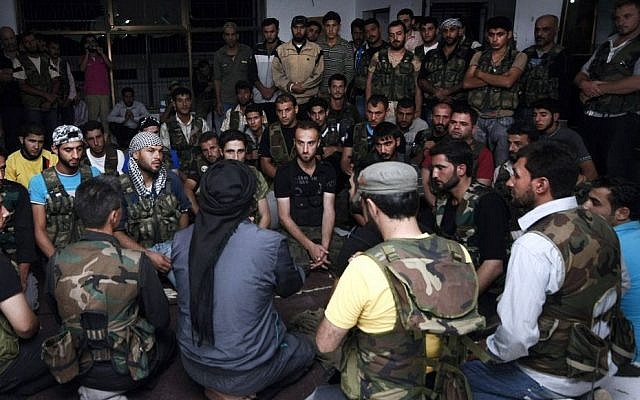
Except that, after three weeks in Azaz, in northwestern Syria, he announced that he wasn’t leaving. She pleaded with him, in vain, she says, and told him she couldn’t stand it any longer. He drove them to the border early one morning, and she and the children fled to relative safety through a hole in the fence.
“It wasn’t the first time he’d taken me to a place that I didn’t want to be. He’d done that a few times while we were married,” she says now. “I didn’t want to go to Egypt when we were in Egypt. I didn’t want to go and live in the north coast near Libya. He made me go there. He would always ruin every stable home condition. Wherever I was happy, he was not happy. Every time I felt comfortable and stable and had friends, I was always happy, but he wasn’t because it wasn’t religious enough for him. It wasn’t rigid enough.”
Remember, she urges, “he practically owned me. I was chattel. I wasn’t a free individual. I was never raised to be a freethinking woman. I was always told I’m a Muslim. Men have authority over women. You can’t travel without a mahram, a companion, or relative. All these conditions are put on women. When I was young I didn’t question it.
“He tricked me again, and this time it was the last straw. I couldn’t handle it anymore. With Syria, when I said let’s go back, he wouldn’t return. He used this verse from the Quran: If you turn your back on jihad then you are a hypocrite. I said I’d rather be a hypocrite, thank you very much, and I don’t care. I said I’m going to go without you then, and he agreed, because truthfully for a long time I was in this marriage and he wouldn’t give me a divorce. And I had no one to go to because I was in trouble. He was fed up with me as much as I was fed up with him. I was always stopping him from fulfilling his boyhood dreams of war and being like a cowboy or whatever. He was bored with married life. He got bored of paying bills to survive, taking care [of a family]. He couldn’t handle the responsibility, even though he forced it on me and I didn’t want it. He was against contraception. I had no rights.
“So it was, like, a bit of a nasty story, to be honest,” she says with quite sensational understatement. “A bit of a troublesome story.”
A new life in Texas
And now Tania Joya lives in Texas, is divorced from John/Yahya (in February 2015), and remarried to Craig Burma (in June 2018). They, too, met online, where Joya, the Texas Monthly reported, wrote in her online profile that her “husband had gone off to be the next Osama bin Laden,” and got 1,300 replies.
She came to Texas because, quite simply, she has four children by her ex-husband and needed the help that only his parents could provide. “When I left him, I had nothing,” she says. ” John always made me dependent on him. I didn’t even have my own bank account. I needed help with my kids. I was pregnant. My in-laws, John’s parents, took me in. They helped me get on my feet.”
Today, they share custody. “John’s out of the picture. It’s the parents who are the legal guardians,” she specifies. Her kids are with her on weekends and holidays, and with their grandparents the rest of the time.
How do they feel about their son’s life choices? They told the Atlantic they regarded his conversion to Islam as a case of mental weakness. “Every university town in this country has a mosque for one reason,” said his father, Timothy. “Kids are away from home for the first time, vulnerable and subject to influence. They hear the message and they’re hooked, and that’s what happened to John.”
Says Joya: “It was always heartbreaking for them to see their son change. His mom was really close to John and she lost her baby son, her only son. That was really devastating. They saw him just rolling down a dark hill. They did everything they could to help.”
Still, she adds, “I would have liked it if they had believed me when I complained to them about him. It wasn’t until I came back from Syria that they realized that I wasn’t making up how he treated me. They didn’t want to believe that their son was a monster. They were in denial.”
She remained in touch with al-Bahrumi for several years after she’d fled Syria, she says, via Telegram and Skype; he broke off contact after the Atlantic article appeared almost two years ago. “Everything, all the information I got, I passed it on to the authorities,” she says. “That’s what I did voluntarily, because I was very appreciative of the US government for giving me a second chance.”

As far as she knows, he’s still in Syria, still involved with Islamic State. “He’s not the second in command of ISIS or whatever,” she says firmly, rejecting a thesis posited in the Atlantic article in 2017 that he might have succeeded Abu Muhammed al-Adnani, killed by a US drone in 2016, as Islamic State’s second most powerful figure, though she acknowledges that he knew Adnani. “If he is the highest ranking American, it’s because there aren’t other Americans in ISIS that have the skill set that he has, and that wouldn’t surprise me. That’s all I know.”
Author Wood described al-Bahrumi not as some bizarre, marginal recruit, but as a highly influential figure in Islamic State. Based on an interview with a fellow convert, Musa Cerantonio, who called him a teacher and leader, the Atlantic article said al-Bahrumi “had done much to prepare Muslims for the religious obligations that would kick in once a caliphate had been established.”
Wrote Wood: “Jihadists in Syria knew him by reputation, and they honored him when they met him. Cerantonio said that in early 2014, Yahya had pressed the leaders of what was then the Islamic State of Iraq and al-Sham (ISIS) to declare a caliphate. He began preaching that the conditions for the declaration of a valid caliphate had been met… He called for emigration to lands where Sharia would be fully enforced, and wrote that choosing not to emigrate was a form of apostasy… He called for Muslims to hate, fight, and kill infidels — among whom, he said, were many so-called Muslims who nullified their faith by neglecting prayer, deviating from the narrow literalism of his interpretation of scripture, or, in the case of rulers, not instituting the brutal system of justice for which the Islamic State was then becoming famous.”
The Atlantic piece also termed al-Bahrumi “Islamic State’s leading producer of high-end English-language propaganda as a prolific writer for its flagship magazines, Dabiq and Rumiyah. “The first article in Dabiq that I have been able to confirm was written by Yahya was published in April 2016, and took as its subject Western Muslims who, despite calling themselves Muslims, are infidels,” wrote Wood. “The headline, ‘Kill the Imams of Kufr [Disbelief] in the West,’ was only marginally less grotesque than the accompanying design: crosshairs over images of prominent mainstream Western Muslims; an image of a crouching, blindfolded ‘apostate’ at the moment an executioner’s blade enters his neck. In the article, Yahya recounted many stories of Muhammad and his companions’ harsh treatment of Muslims who had lapsed. Hands and feet are severed, eyes gouged out with nails, bodies stomped to death.”
Has her ex-husband killed people for ISIS? “I’ve no idea, but it wouldn’t surprise me,” Joya says. “He was in a battle with Hezbollah once, many years ago. And then he got injured by a mortar. It could have happened. I just don’t know. He’s never told me.” According to the Atlantic, he was hit by shrapnel, “nearly severing his spine,” in a mortar blast when fighting with an Islamic State–aligned group near Aleppo in 2014. “His injuries left him temporarily unable to walk… but he was content and proud… During that period he took up with a new wife, a Syrian, and had a daughter with her about a year after Tania’s departure, and another some time later.”
Summarized Wood in the Atlantic piece, “He in some ways resembled his fellow Americans in Syria: He went to fight, and he would have welcomed a battlefield death if God had willed it. But he was no mere foot soldier; his religious scholarship, connections, and standing distinguished him…”
I ask Joya what she would say or do if he contacted her today? “We’re divorced. He wouldn’t contact me,” she answers shortly. “I think he’d just contact his mom.”
How, practically speaking, does one divorce a husband on the other side of the world fighting for a terrorist organization? “I said it was abandonment,” she explains. “We hadn’t been together for more than six months. They put something in the newspaper to announce to John: Do you argue with this claim that Joya wants to get a divorce? So they don’t hear back from him, the court doesn’t hear back from him, and they allow you to divorce.”
The new Joya is involved in a US anti-extremism initiative called Parents for Peace, gives talks on de-radicalization, and is planning a book — a memoir, she says, with a message “for people who want to understand the mindset or the emotions, and the push and pull factors, of what draws people into extremism and what life is like. It’s dark. I just want to shed light on it, because it needs to be spoken about rather than being a taboo subject that will continue happening. I want to explain how I de-radicalized — through education and reading American literature.”
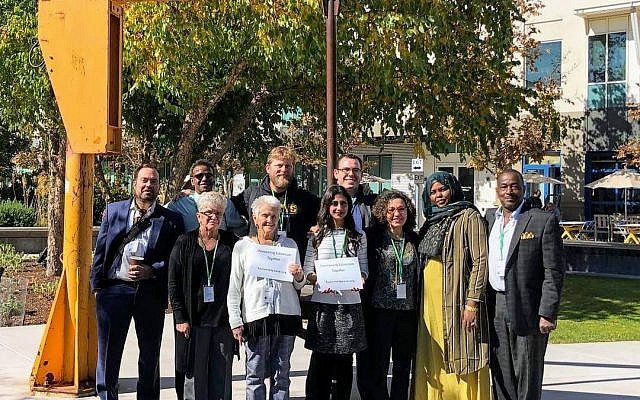
She is not an American citizen, but hopes to become one. “The values of America opened my mind,” she says, “and helped me just get out of that sphere. The thing that was controlling me: It liberated me from that. I was able to think for myself finally. I find that there are some women who talk to me — they are immigrants to America, usually from India, and they’ll agree with me. They’ll say that when we came to America we no longer had our communities putting pressure on us to have a collective way of thinking, no matter how wrong it is. We were allowed to think for ourselves. It is very liberating and it also makes us more compassionate people.”
How does she describe her religion today? “I’m an agnostic atheist,” Joya says. “I’m not saying it’s impossible that there is a god. If there is a god, it’s like some crazy alien that’s bipolar and doesn’t really care about us. It’s nicer to me to believe that there is no god, because if there is a god it’s messed up. I’m a humanist if anything. I think god is irrelevant. Mankind just has to make it on its own.”
And how does she see her life panning out now? “I need meaning in my life. My children give meaning. Fifty percent of the reason why I changed and de-radicalized was because of my children,” she says. “I love them more than my religion, which I’m not allowed to do in Islam. I want to see them grow up and benefiting humanity, not destroying it. I want to watch them thrive and do well. That conflicted with my religion. But I was already waning in my belief.
“Now they’re Christian. Now they can be whatever they want. As long as they’re not breaking the law, I think I’m always going to be a proud mother.”
Her activism work, she says, “gives me purpose. There are so many Muslim girls, Muslim women, and minorities, gays, who are on the receiving end of abuse from religious fanatics, extremists. I’m there for them. My story goes out to them.
“There are so many people who suspect that I still support ISIS,” she says candidly. “But I get messages from girls who say, we understood your story because we’re there — we’re stuck. Seeing me gives them hope that they can come out of their abusive marriage, of their communities. I tell them, I’m here for you. I keep in contact. That’s what I do. I’m here for other people who are being oppressed by Islam.”
Among those apparently unpersuaded by the extent of her transformation were the British TV interviewers who abruptly ended their conversation with her in January last year after she said her ex-husband had a good side.
Joya is undeterred: “Everyone who knew John in the past, before he became a Muslim, loved him and said he was a really good guy. He was liked by people. The more he got depressed and the more he put all his eggs into one basket and that was about God and Islam, the worse he became, the more he became someone else. As a child growing up before he turned 17 he was adorable. And I know lots of people who knew him — his entire family and the community he grew up in.”
The Atlantic piece on her husband, which appeared in the March 2017 print edition and online a few weeks earlier, noted that Joya “has left jihadism, but she cannot completely leave Yahya. On social media,” the article noted, without specifying the date, “she wrote to a relative of her husband’s: … ‘We made some really poor choices that backfired on us… I’m somewhat jealous of the love and devotion he has for Islam over me.'”
In a subsequent piece and documentary film devoted to her story, however, the Atlantic’s Wood concluded that Joya “has transformed as remarkably as her husband, but in reverse. John traded his American patrimony — money, family — for jihad. Tania traded jihad for America.”
Stressed Wood: “She never, in my conversations with her, advocated violence or seriously regretted leaving John at the Syrian border. And yet there are signs — not of violence, but of a permanent effect of her jihadist brainwashing… She never said she wished to return to Syria, but she did lament that so many of the Islamic State’s followers are being bombed ‘just because they just want to live under a caliphate.’ Lines like these come out after hours of perfectly normal conversation.”
The promo for the film — which is entitled The ‘First Lady of ISIS’ — notes, “Together, they traveled the globe, befriending jihadis and grooming their children to become ‘assassins.’ But after ten years of living on the run, Tania began to fear for her family’s safety.”
“I told the little ones, ‘Your dad joined the dark side of the force,’” Tania says in the movie. “I told them, ‘Mommy was part of the dark side of the force, but now I’m a dark Jedi.'”
Coming away from his interviews with Joya in Texas in late 2017, Wood observed that “From the way she dresses, you’d think she spent the last decade reading Italian Vogue, not the Koran.”
In our telephone conversation, Joya levels some biting, scatter-gun criticism at Britain, British journalists, British attitudes to Islam, and British attitudes to her: “When I talk to people in the UK, I can’t tell from the journalists whether it’s a secular country or a country that lives under a Muslim dictatorship,” she declares. “Because they hate what I say so much. Even though what I’m saying is objective: I never wanted Islam to be a false religion. I didn’t want to be that sucker who got indoctrinated. But the facts are undeniable. If I can be reformed through knowledge and facts, there are others who can. And it’s happened.”
There are lots of other people like her?” There’s a huge ex-Muslim community. I didn’t realize this until after I did the interview with Piers Morgan. They liked what I said. Look how she’s been silenced, even though she’s speaking something that is true: Islam is not in line with human rights. It’s because it’s such an ancient way of life. We know so much more now. As human beings, we’ve evolved. We’ve grown. Luckily we have answers that they didn’t have back then. So they had to have superstitious answers to explain the world around them. What I’m saying is logical, and yet it inflames the British public.
“I can imagine it [inflaming] Egypt because being an atheist in Egypt is illegal. If in the UK, Muslims and non-Muslims can’t accept a difference of opinion, or freedom of speech, then they’re not holding the humanist, secular values they claim to be holding. They’re not really moderates.”
‘I really like Jews’
Our interview marks the first time, Joya says, that she’s spoken to an Israeli journalist, but certainly not her first interaction with Jews.
For one thing, her second-eldest sister married a British/Italian man of Jewish descent. “He had to take the Shahada” — that is, to declare belief in the oneness of God and in Muhammad as his final prophet, or, as she puts it, “to convert to Islam superficially” — “before marrying my sister.” Otherwise, she says, “my family would have made them outcasts.”
And then there’s her burgeoning connection to Dallas’s Temple Shalom. “I really like Jews. I love them a lot,” she says. This all started when she did a speaking event at the Texas Monthly, and a lady named Jerri Grunewald from that congregation attended. They got talking and “she asked me if I’d like to get involved with interfaith work, which I told her I loved doing. We just built up a friendship from there.”
Next week, this relationship will see Joya invited as the featured speaker of the 16th annual “Intra-Faith Sisterhood Brunch” at the Temple, advertised as being dedicated this year to the theme of “Escape and Triumph.”
“Tania will speak about her transition from a marriage to a ranking ISIS member, to one countering the forces of violent extremism, and I believe the audience will be fascinated by her,” Grunewald told the Texas Jewish Post. “Tania’s evolution as a woman, as a human being and her strength in becoming an independent thinker and role model is a story to be heard.”
“My goal is to protect other young people from the indoctrination and grooming process that I was vulnerable to,” Joya told her local Jewish weekly. “Prevention programs are the key to protecting all American youth from radicalization… Jihadists need to be heard because if we don’t know their arguments, and how poor their arguments are, we’re not going to be able to discuss and refute them.”
Has she been to events at the Temple? “Yes, Succos,” she says happily, “when they have a tent outside. I took my children there to decorate it. I missed Hanukkah because all of my sons were busy. They’re going to invite me to future events. I enjoy it. It’s nice. There’s no pressure.”
She’s made friends in the community, she says: “I just mingle and socialize with them. They’re incredibly open-minded people, that I really admire.”
“I like so much how, in Reform Judaism, you can still be Jewish but not a believer,” she enthuses. “It’s more about the customs that you’re just practicing — your ancestors’ customs, which are really nice customs and traditions to do — as long as no one’s getting hurt, in sacrifices.” (She laughs.) “I take comfort in that community a lot.”
And what does she think, know, have to say about Israel? As often in our phone conversation, she answers instantly, in a gush of words, some of them quite unexpected: “It’s funny. John and I both felt, before he left, of course: The best man wins in a war. They were stronger. If the Palestinians and the Arab countries had just been more Islamic, and more organized, and had institutions that functioned, maybe they would have won. That’s how I thought when I was a Muslim.
“As a non-Muslim, I really didn’t care. I mean I care about people suffering. I care about human beings everywhere. But it wasn’t like, Oh my brothers and sisters are dying — the Palestinians. I mean, I did care like that when I was a Muslim, but as a non-Muslim, I don’t know — I feel like it’s war, it’s happened. Maybe if all the Palestinians convert to Judaism, maybe there’ll be peace. That’s my solution to the Palestinian-Israeli problem. Very far-fetched. I’m a dreamer.” (Again, she laughs.)
Yes, that’s pretty far-fetched, I reply.
“But it is a way to peace,” she lobs back.
With her newfound enthusiasm for Judaism and Reform Jews, she’s not planning to convert, is she? “I don’t believe I can convert,” she says. “I feel like it’s genetic — with the Ashkenazis and the Sephardic. I’d just be pretending.” (She laughs.)
“I’ll go along for the fun holidays and stuff, and be friends. But I don’t believe in conversions to Judaism. I know some people do, but I’d feel like I’m faking it. I know that’s going to sound strange. A lot of the things I say sound strange. But I’ve had a different experience in life to most people, I guess.”
Before hanging up, I mention that my wife was born in Texas, and Joya says politely that we should contact her if we visit. I lightly suggest that she should do the same if she ever comes to Jerusalem.
“I will,” she promises. “It’s going to happen. I need to see the Holy Land of conflict,” she says, laughing.
Really? “Yes. I’m so curious. I love history. I need to know. I need to see it.”

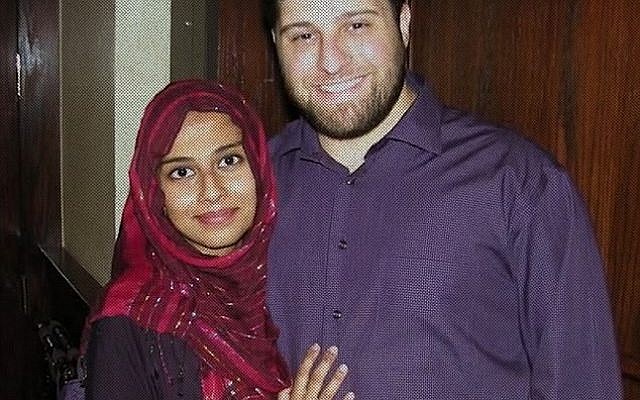
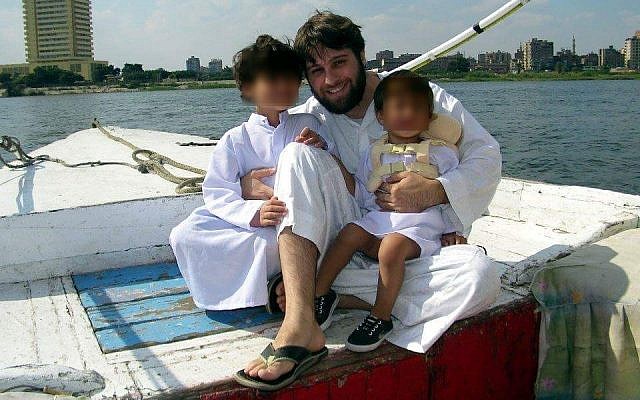
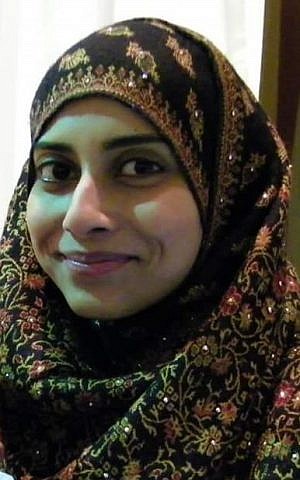
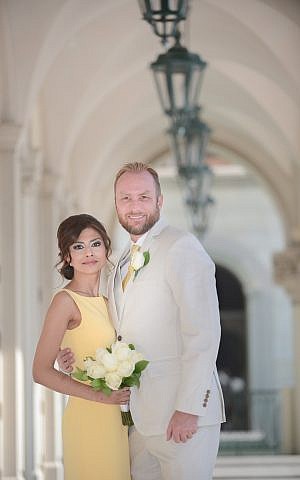
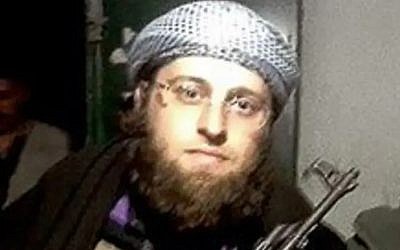


3 comments:
I give her lots of credit for not publicly badmouthing her ex; I have seen too many children of divorce get hurt when one parent trashtalks the other.
https://nypost.com/2022/03/02/texas-rep-van-taylor-drops-reelection-bid-over-affair-with-isis-bride/
No mention in the Texas Weekly of her adulterous affair that destroyed the family of Congressman Van Taylor
This woman clearly has issues and is an opportunist. Real danger. Never to be trusted.
How many US Congressmen on the intelligence committee have been preyed on by a honey trap like this? Doesn't look like it's too hard to do.
Without yiras shamayim, men are fools.
Post a Comment